Best ApplicantPRO Alternatives for Faster Hiring in 2026
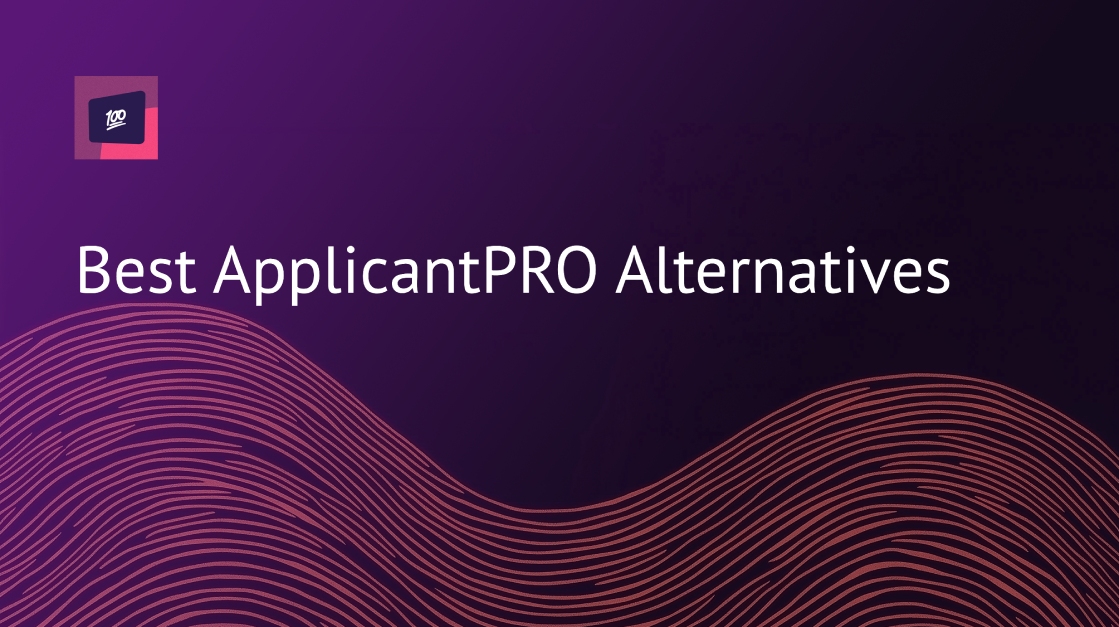
Is ApplicantPRO holding your hiring process back? With usability issues, limited integrations, and clunky reporting, it’s no wonder users are searching for ApplicantPRO alternatives. If you’re tired of complex workflows, restricted customization, and sluggish performance, explore these top ApplicantPRO alternatives.
ApplicantPRO Alternatives
the best candidates faster
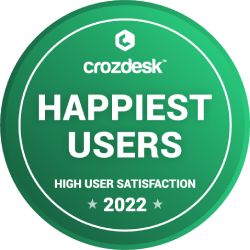
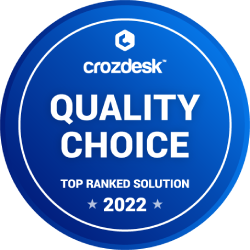

100Hires
100Hires is a very popular ATS among small and mid-sized companies, it holds numerous G2 badges, including 'Leader' in Recruitment Marketing and Candidate Relationship Management, 'Most Implementable' for Small-Business and Mid-Market, and 'Best Usability' across multiple categories. Ready to experience 100Hires? Get a demo or start your free trial today to see how 100Hires can optimize your hiring process. For more information on plans and options, check out our pricing page.
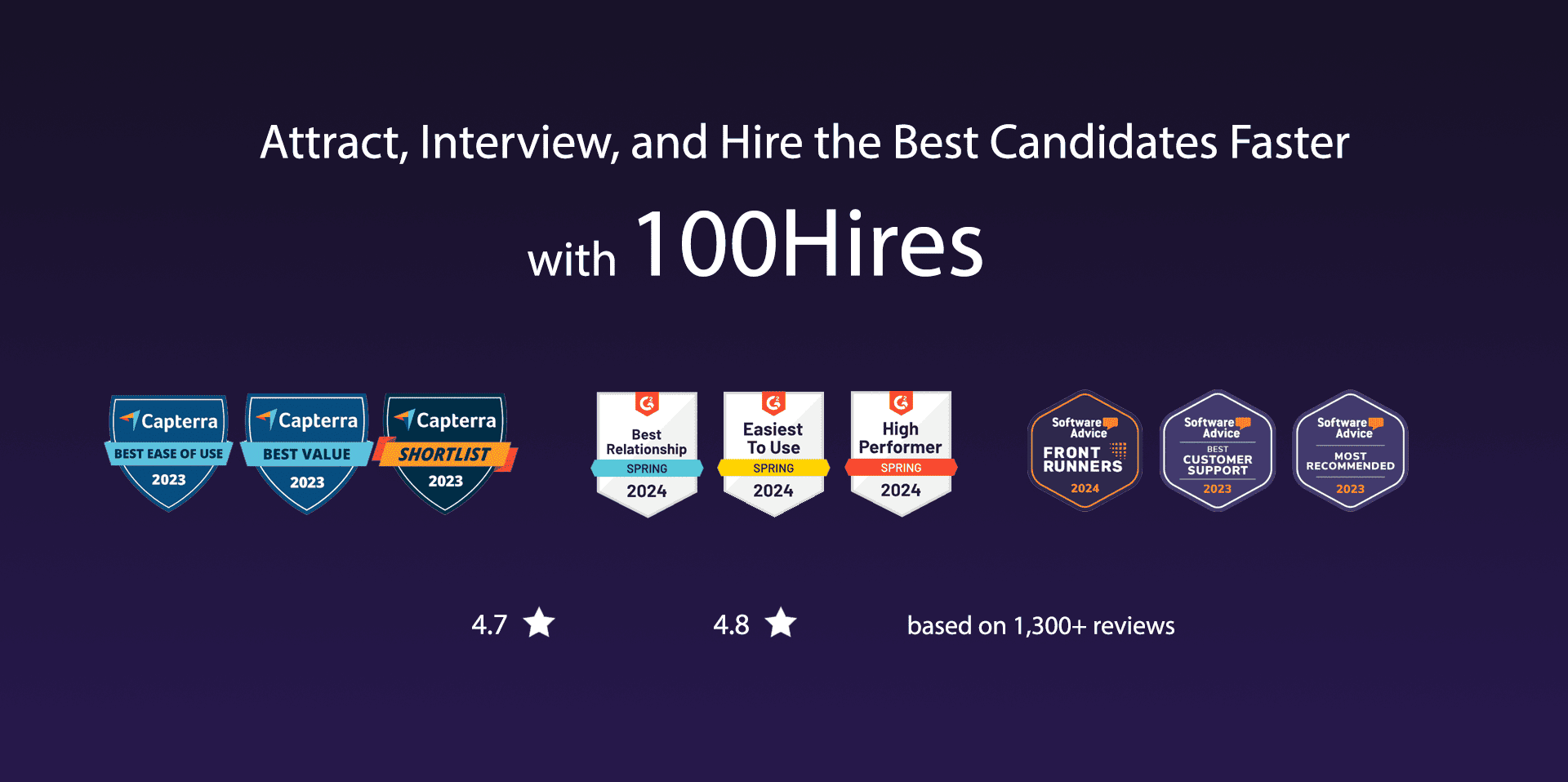
G2 rating: 4.8/5 based on 831 reviews.
Capterra rating: 4.9/5 based on 742 reviews.
1. Increased Applicant Reach:
- Post to major job boards (Indeed, LinkedIn, Glassdoor, etc.) with a single click, expanding job visibility and attracting more top talent.
- Real-time tracking and analytics allow clients to monitor job posting performance and optimize recruitment strategies.
2. Streamlined Recruitment Process:
- Centralized candidate data with easy access to interaction history and candidate statuses.
- Reduces duplicate communication and enhances the candidate experience.
3. Time Savings with AI:
- AI-generated job descriptions, application forms, and interview questions reduce time spent on resume screening.
- AI-driven candidate ranking helps prioritize the best candidates quickly.
4. Automation for Efficiency:
- Integrated scheduling with Google or Outlook calendars, knockout questions, duplicate detection, and automated communications (notifications, follow-ups) reduce manual effort.
- Zapier integration allows seamless connectivity with third-party tools.
100Hires Pricing:
100Hires offers three pricing tiers: Start at $75/month (billed annually) for companies with minimal hiring needs, supporting up to 3 jobs and 1 user. The Advanced plan, at $199/month, includes unlimited jobs, candidates, and users, plus features like automated emails and a custom domain. The Pro plan, at $399/month, adds advanced sourcing tools, contact enrichment, and onboarding support, ideal for sourcing passive candidates.
Applicantstack
ApplicantStack is an applicant tracking system founded in 2007.
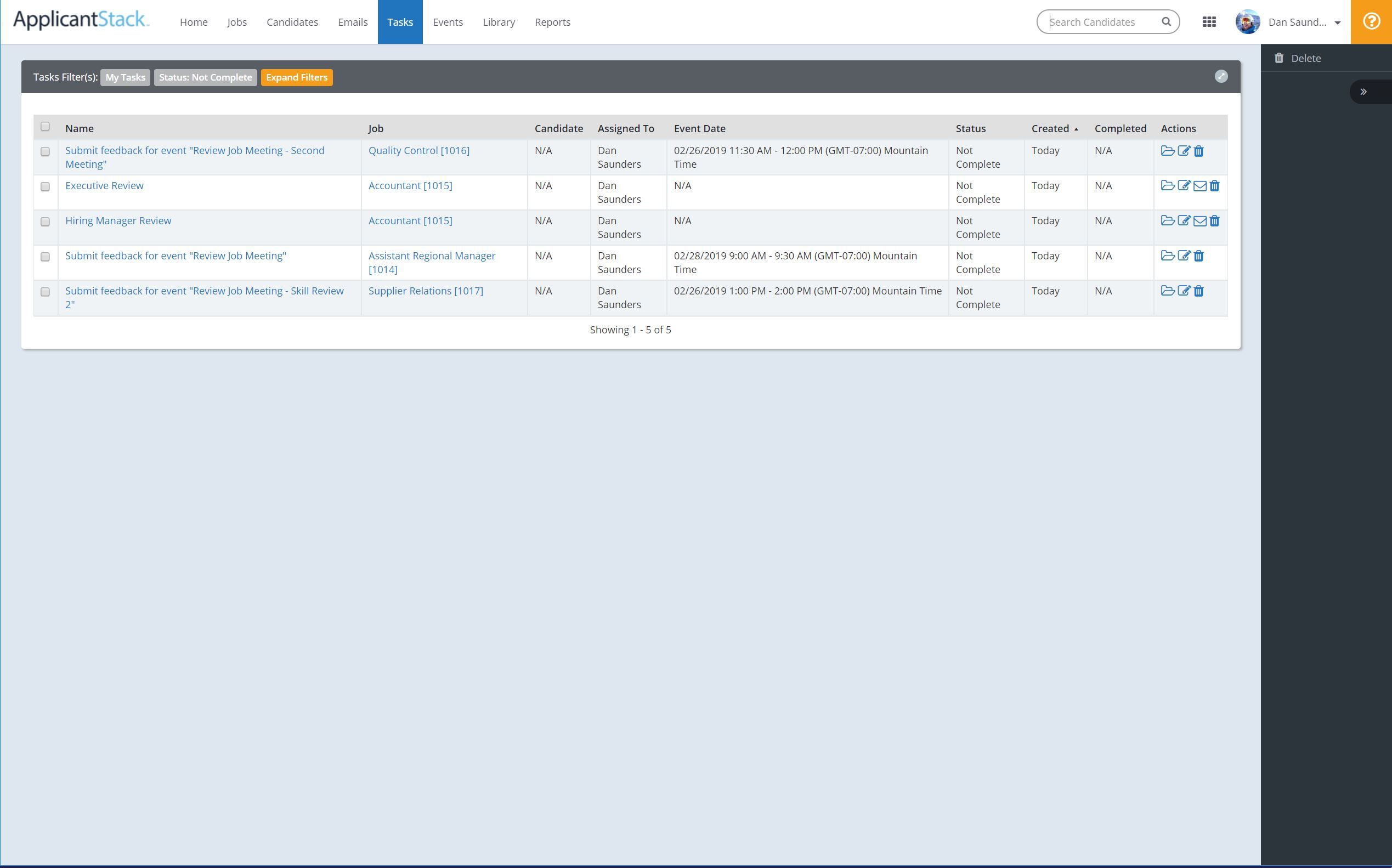
G2 rating: 4.4/5 based on 755 reviews.
Capterra rating: 4.4/5 based on 1507 reviews.
Typical customers of ApplicantStack are primarily based in the United States (85.61%), followed by smaller shares in Saudi Arabia (2.99%), India (2.38%), Canada (1.48%), and the United Kingdom (1.31%). The platform serves various industries, with a significant presence in Hospital & Health Care (12%), Health, Wellness, and Fitness (10%), Staffing and Recruiting (6%), Construction (5%), and Human Resources (5%).
Customer company sizes vary, with a notable concentration in small to mid-sized businesses. Based on G2 reviews, 40% of users come from companies with fewer than 50 employees, 54% from companies with 51-1,000 employees, and 6% from companies with more than 1,000 employees. Capterra reviews indicate that 68.8% of users represent organizations with 1-500 employees, 12.8% are from companies with 501-5,000 employees, and 2.4% from larger enterprises with more than 5,000 employees.
Applicantstack Pricing:
The Starter plan costs $29/month and includes 1 active job posting, ideal for small-scale hiring. The Growth plan at $49/month allows 3 active job postings. The Recruit plan, priced at $99/month, offers unlimited active jobs, additional admins, and hiring managers. The Bundle plan at $150/month combines unlimited job postings with an onboarding feature for a streamlined hiring experience.
Applicantstack Pros:
- Ease of Use (22 mentions): Frequently highlighted for its user-friendly interface and simplicity, making it easy to navigate and operate.
- Integration with Job Boards (15 mentions): Users appreciate the seamless integration with multiple job boards like Indeed and LinkedIn, simplifying the posting process.
- Cost-Effectiveness (13 mentions): Noted for its affordability and good value, especially for small to mid-sized companies.
Applicantstack Cons:
- Limited Reporting Features (7 mentions): Users find the reporting function could be more robust and easier to use, with better filters.
- Search Functionality Limitations (5 mentions): Difficulties with searching job postings and candidates efficiently, particularly issues with not being able to search without exact names or being unable to search job titles directly.
- Lack of Automation and Customization (4 mentions): Some features require manual intervention, which users find cumbersome; there's also a desire for more customizable options.
- Additional Costs for Features (4 mentions): Dislikes around having to pay extra for features such as texting and onboarding sections.
- User Interface and Usability Issues (4 mentions): New users find the interface not very intuitive and mention a steep learning curve; some also noted that navigation can be confusing.
- Integration Issues (3 mentions): Challenges with integrating and using some of the software's features effectively, such as integration with job boards not being optimal.
- Customer Service and Support (3 mentions): Some users expressed dissatisfaction with the customer support, noting a lack of one-on-one phone support and delays in email responses.
- Onboarding Feature Limitations (2 mentions): Users expressed a desire for more comprehensive HR features within the onboarding process.
- Technical Issues and Bugs (2 mentions): Minor bugs and glitches mentioned, including issues with notifications and document management.
- Job Posting and Refreshing Difficulties (2 mentions): Challenges with refreshing job postings easily and efficiently; some users expressed a need for a simpler way to keep job listings updated.
Ashby
Ashby, founded in 2018, is an applicant tracking system that has raised $70 million.
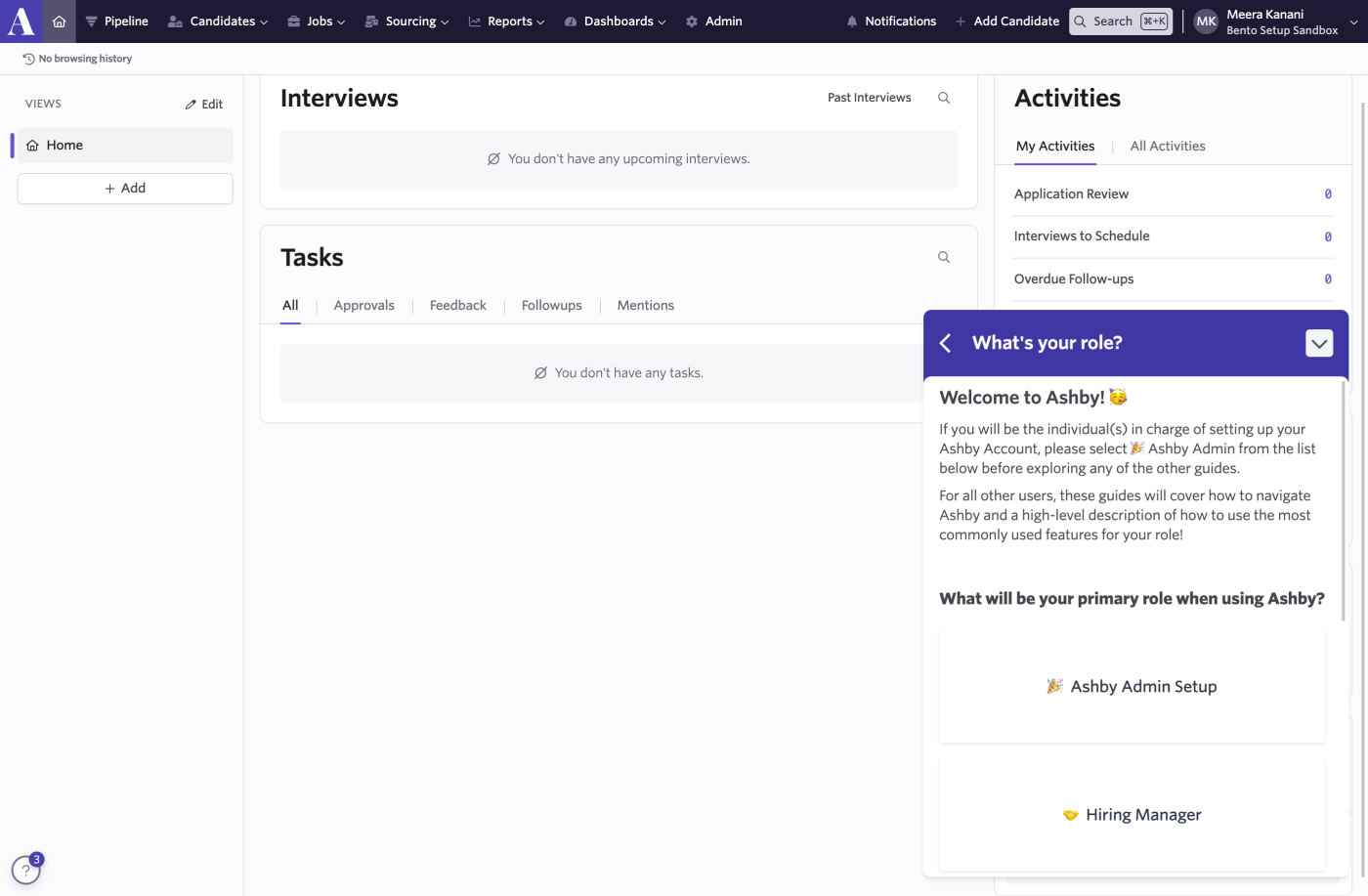
G2 rating: 4.6/5 based on 66 reviews.
Capterra rating: 4.8/5 based on 5 reviews.
Ashby's typical customers are primarily based in the United States (51.74%), with smaller shares in the United Kingdom (5.59%), India (4.98%), Canada (4.32%), and Nigeria (2.17%). The key industries are Information Technology and Services (50%) and Staffing and Recruiting (50%).
According to G2, 64.8% of customers have 51-1000 employees, 29.6% have fewer than 50 employees, and 5.6% have more than 1000. Capterra reviews indicate an even split, with 50% of customers having 1-10 employees and 50% having 51-200 employees.
Ashby Pricing:
The Foundations Plan ranges from $300 to $900 per month, depending on company size (up to 100 employees), with a 10% discount for annual commitments and emerging market pricing options. The Plus Plan is for companies with 101-1000 employees, offering scalable recruiting with pricing based on size, usage, and commitment. The Enterprise Plan is tailored for companies with over 1,000 employees, featuring enterprise-grade recruiting solutions with predictable pricing. Ashby Analytics integrates with existing ATS tools, providing advanced reporting for companies with 100+ employees, with usage-based pricing.
Ashby Pros:
- Powerful Analytics and Reporting Tools (Mentioned 20 times): Users highly value the robust analytics and reporting capabilities of Ashby, which enable data-driven decision-making and insights into recruitment metrics.
- User-Friendly Interface and Ease of Use (Mentioned 15 times): Ashby's intuitive design and simplicity, making it accessible for both seasoned HR professionals and newcomers.
- Customization and Flexibility (Mentioned 15 times): The ability to customize various aspects of the platform, including workflows and reports, to fit specific needs was a significant advantage noted by many users.
Ashby Cons:
- Complexity and Overwhelming Features (5 times): The platform's extensive customization and numerous features can be overwhelming, especially for small teams or solo recruiters, making navigation and organization challenging.
- Learning Curve and Usability (5 times): Users note a significant learning curve to fully utilize Ashby's capabilities, finding the platform not as intuitive for creating reports and using advanced features.
- Integration and Compatibility Issues (3 times): While integrations are valued, some users experience slow performance with services like Gmail or challenges in importing data from other ATS systems.
- Reporting and Analytics Flexibility (3 times): Despite high praise for reporting capabilities, some users seek more flexibility or customization in reports, including different options for data analysis metrics.
- User Interface (UI) Concerns (3 times): A few users mentioned desires for a more advanced or intuitive UI, indicating a preference for a more streamlined and visually appealing interface.
- Performance and Speed (2 times): There are occasional comments on the system being slow to respond or load, which affects the efficiency of certain tasks.
- Need for More Visibility on Updates (2 times): Continuous updates are appreciated, but users desire more effective communication regarding new features and product updates.
- Privacy and Data Accuracy Concerns (2 times): Rare mentions of concerns around privacy and occasional inaccuracies in reporting, indicating a need for continuous improvement in data integrity.
- Customer Support Enhancements (1 time): Customer support is generally well-regarded, but there are suggestions for improvements like adding live chat support and more proactive bug fixes.
- Scheduling Feature Limitations (1 time): Some users find the scheduling features not as powerful as those of competitors, suggesting room for enhancement.
Avature
Avature, founded in 2005, is an applicant tracking system based in Argentina.
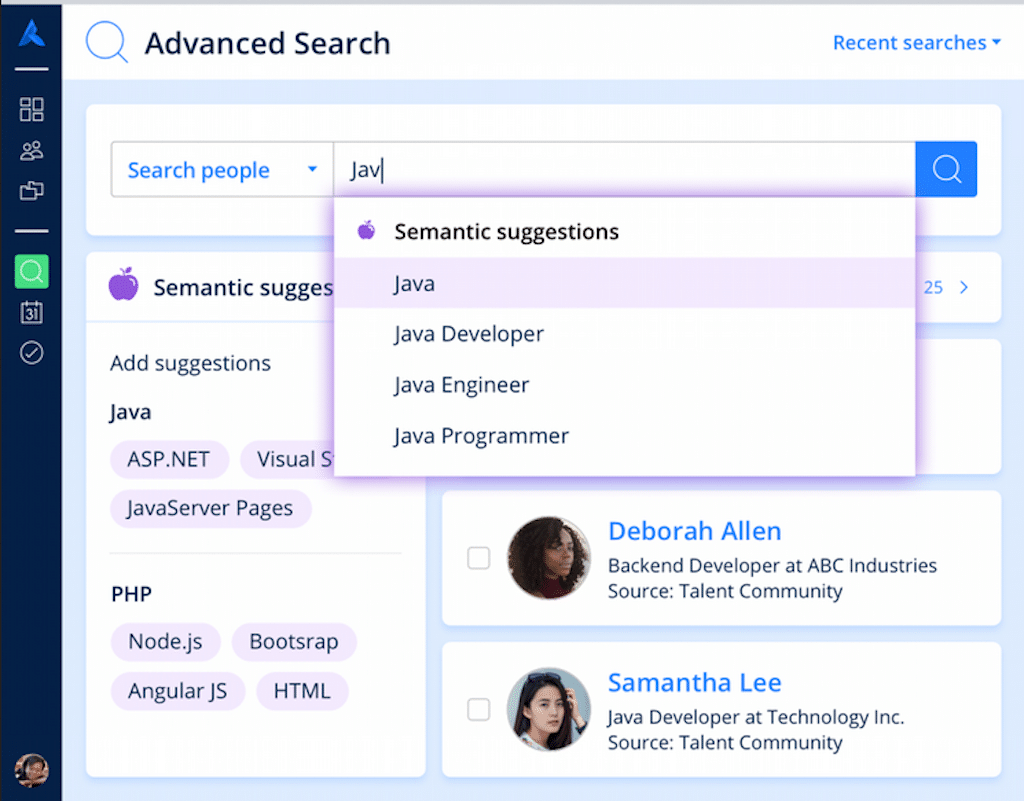
G2 rating: 4.4/5 based on 96 reviews.
Capterra rating: 4.7/5 based on 63 reviews.
Avature's typical customers are primarily based in the United States (57.41%), with smaller shares in India (9.66%), Spain (6.36%), the United Kingdom (4.33%), and Germany (3.74%). Key industries include Human Resources (16%), Hospital & Health Care (8%), Financial Services (8%), Information Technology and Services (8%), and Staffing and Recruiting (8%).
According to G2, 66% of customers have more than 1000 employees, 26% have 51-1000 employees, and 8% have fewer than 50 employees. Capterra reviews show 46.2% of customers with more than 10,000 employees and smaller shares across other size categories.
Avature Pricing:
Avature's pricing varies significantly based on feature needs, support, training, and customization. Implementation costs start at £30,000, with options for fixed-fee or time-and-materials billing. Enterprise pricing generally ranges from $1 to over $12 per user per month, depending on the service tier. Pricing details for Avature's plans are not disclosed publicly.
Avature Pros:
- High Customizability and Flexibility (27 mentions) - The ability to customize workflows, reports, and the overall user experience to fit specific business needs was highly praised.
- User-Friendly Interface (15 mentions) - Users appreciated the clean, intuitive, and easy-to-navigate interface that simplifies recruitment processes.
- Comprehensive Reporting and Analytics (11 mentions) - Avature provides detailed and customizable reporting capabilities, allowing for granular data analysis.
Avature Cons:
- Complex and Steep Learning Curve (15 mentions) - Many users found the platform complex and challenging to learn, particularly because of its extensive customization options.
- Customization Limitations and Permissions (11 mentions) - Some users expressed frustration over restrictions related to customizing certain aspects of the platform and permissions/access issues.
- Inadequate Customer Support and Slow Response Times (9 mentions) - Delays and inconsistencies in customer support were noted, especially in handling specific, complex requests or during project implementation.
- Integration and Compatibility Issues (8 mentions) - Challenges with integrating other systems and the need for more robust out-of-the-box integration capabilities were highlighted.
- High Costs and Additional Charges for Features (7 mentions) - Concerns were raised about the platform being expensive, with essential features often requiring additional payment.
- Inconsistencies and Bugs (6 mentions) - Users reported encountering bugs and inconsistencies within the platform that affected user experience.
- Limited Reporting and Data Management Features (5 mentions) - Difficulties with reporting functionalities, including complex setup for analytics and inadequate data export capabilities, were mentioned.
- Outdated User Interface and Aesthetic Issues (5 mentions) - Some users found the interface not visually appealing and less user-friendly than desired.
- Lack of Comprehensive Training and Documentation (4 mentions) - A need for better training materials and documentation to help users understand and utilize the platform effectively was identified.
- Issues with Updates and New Features (4 mentions) - Users experienced problems when new updates or features were released, often leading to unintended consequences.
Betterteam
Betterteam, founded in 2015, is an applicant tracking system based in the Philippines.
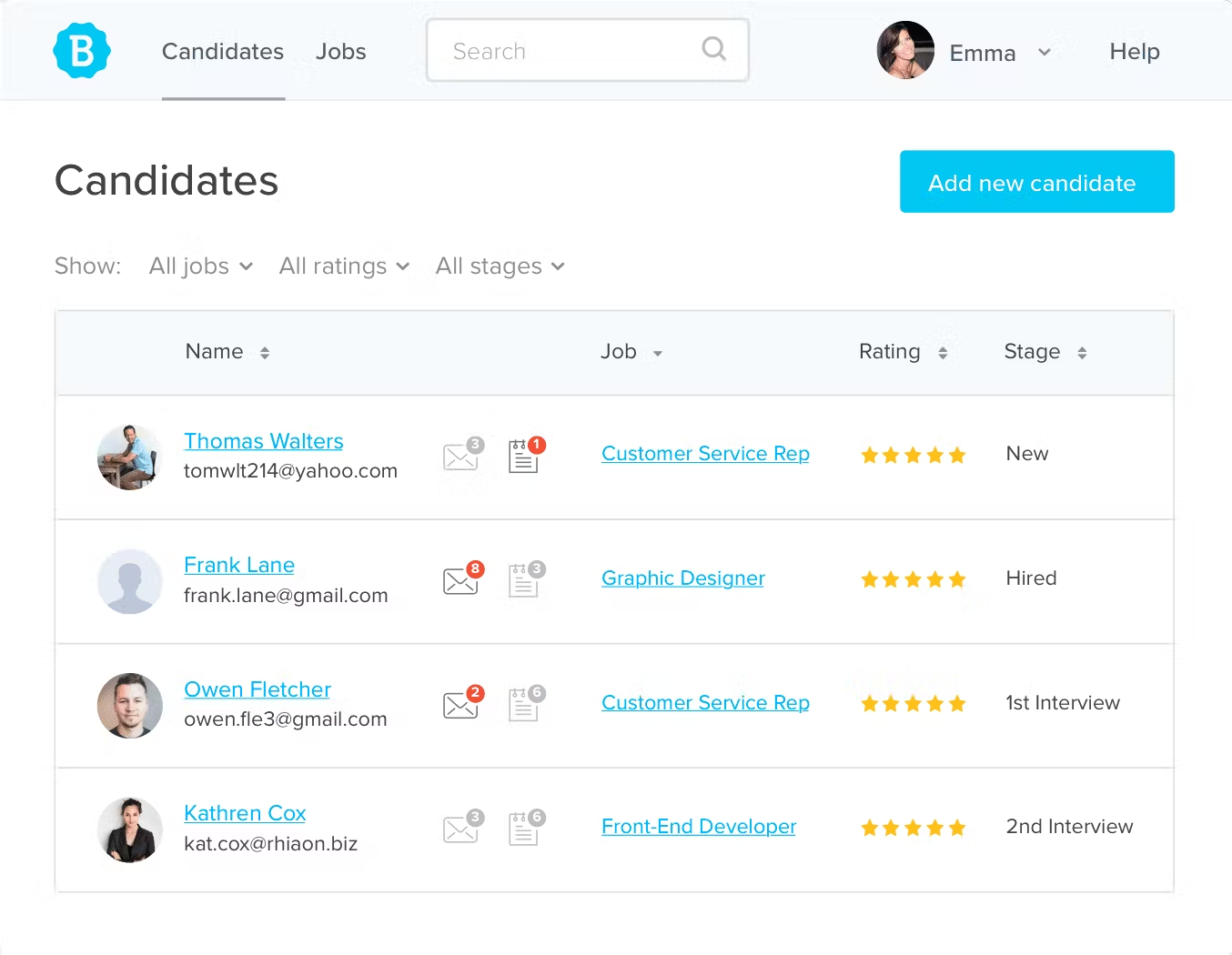
G2 rating: 3/5 based on 1 reviews.
Capterra rating: 4.8/5 based on 299 reviews.
Betterteam's typical customers are primarily based in the United States (29.32%), with smaller shares in India (9.12%), the United Arab Emirates (6.13%), the Philippines (4.96%), and Canada (4.31%). Key industries include Construction (8%), Financial Services (6%), Food & Beverages (5%), Retail (5%), and Security and Investigations (4%).
According to Capterra reviews, 28.8% of customers have 11-50 employees, 24.8% have 1-10 employees, and 10.4% have 51-200 employees, with smaller shares across other size categories.
Betterteam Pricing:
The Solo Plan costs $39/month and includes 1 job post. The Plus Plan at $99/month allows 3 job posts, and the Premium Plan at $139/month includes 10. The Business Plan costs $209/month with 20 job posts, while the Enterprise Plan at $398/month includes 50 job posts. The Corporate Plan, priced at $598/month, provides up to 200 job posts.
Betterteam Pros:
- Ease of Use and User-Friendly Interface (Mentioned 25 times): Many users find the platform easy to navigate, create job postings, and manage applications, highlighting its user-friendly design.
- Wide Reach and Efficiency in Job Posting (Mentioned 17 times): Users appreciate the ability to post a job once and have it distributed across multiple job boards, emphasizing the tool's efficiency and broad reach.
- Quality and Quantity of Applicants (Mentioned 14 times): The quality and quantity of applicants received through Betterteam are frequently praised, with users noting the high caliber of candidates and the volume of responses.
Betterteam Cons:
- Pricing and Subscription Model Concerns (Mentioned 5 times): Users found the pricing packages confusing or misaligned with the service offerings. There were also calls for more flexible pricing models, especially for small businesses or those with infrequent hiring needs.
- Integration and Compatibility Issues (Mentioned 4 times): Users expressed a desire for better integration with existing Applicant Tracking Systems (ATS) and Customer Relationship Management (CRM) tools, noting the lack of connectors and seamless workflow integration.
- Limited Applicant Management Features (Mentioned 3 times): There's a call for more robust features to manage applicants directly within Betterteam, such as improved filtering options, the ability to contact candidates directly through the platform, and enhanced dispositioning capabilities.
- Miscellaneous Operational Issues (Mentioned 3 times): This includes challenges such as the initial setup for remote staff, the desire for more professional profile options, and the need for clearer information on pricing and subscription details post-trial period.
- Geographic Filtering Limitations (Mentioned 3 times): The lack of effective geographic filtering was a concern, with users receiving applications from candidates outside the intended hiring area, leading to inefficiencies in the screening process.
- Inconsistent Results and Reach (Mentioned 2 times): Some users reported varied success with different job postings, noting that certain positions did not attract any candidates, suggesting inconsistencies in the tool's effectiveness across different roles or industries.
- Content Control and Communication (Mentioned 2 times): Users expressed a desire for more control over job postings, including the ability to approve edits made by Betterteam and to have better communication regarding changes.
- Duplicate Applications (Mentioned 1 time): The issue of receiving duplicate resumes from previously rejected candidates was mentioned, indicating a need for better candidate tracking and history recognition.
- Design and User Interface (Mentioned 1 time): One user specifically mentioned not being a fan of the product's design, suggesting room for improvement in the user interface.
- Limited Candidate Sourcing Options (Mentioned 1 time): There's a wish for the ability to search or source candidate resumes from a database, indicating a need for more proactive recruitment tools within the platform.
Breezy HR
Breezy HR, founded in 2014, is an applicant tracking system that raised $1.9 million and was acquired by Learning Technologies Group.
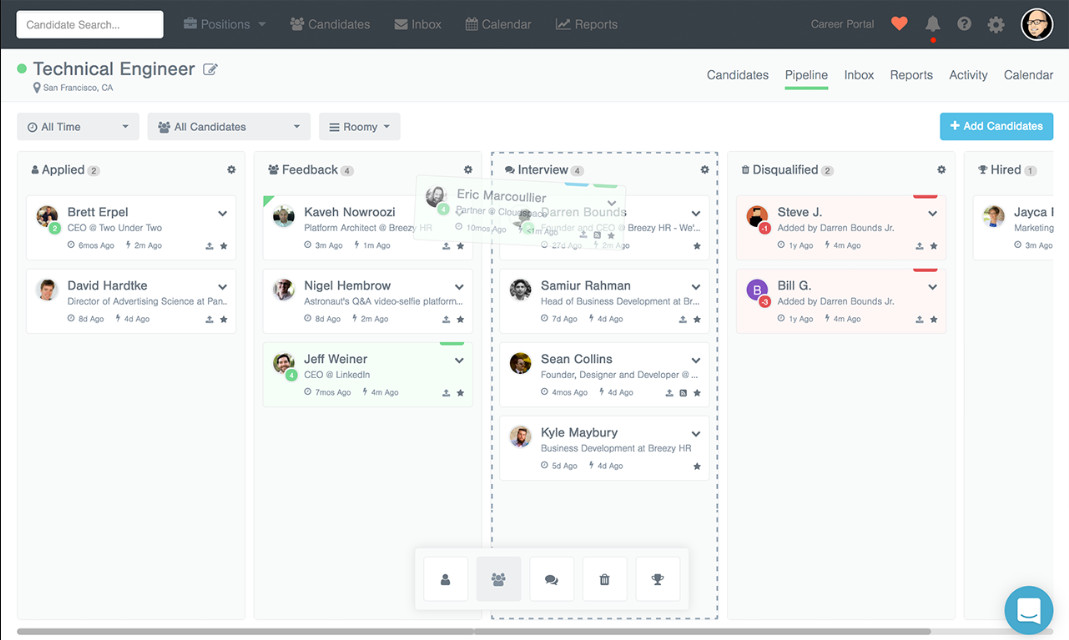
G2 rating: 4.4/5 based on 648 reviews.
Capterra rating: 4.5/5 based on 1413 reviews.
Breezy HR's typical customers are primarily based in the United States (42.22%), with smaller shares in India (6.25%), Canada (6.2%), the United Kingdom (3.52%), and the Philippines (3.4%). Key industries include Information Technology and Services (14%), Computer Software (12%), Real Estate (5%), Marketing and Advertising (4%), and Education Management (4%).
According to G2, 48% of customers have fewer than 50 employees, 42% have 51-1000 employees, and 10% have more than 1000. Capterra reviews show 26.4% of customers with 11-50 employees, 24.8% with 51-200 employees, and smaller shares across other size categories.
Breezy HR Pricing:
The Bootstrap plan is free and covers basic hiring for one position or pool. The Startup plan is $189/month, offering enhanced tools for initial hiring needs. The Growth plan, at $329/month, supports collaborative hiring for expanding teams. The Business plan costs $529/month, providing advanced control and flexibility in hiring. Annual pricing includes 2 months free.
Breezy HR Pros:
- Ease of Use (38 mentions): Users frequently praise Breezy HR for its user-friendly interface, noting that it is simple and intuitive to navigate and operate.
- Efficient Recruitment Process (22 mentions): The software is lauded for streamlining the recruitment process, particularly through features like pipeline management, easy job posting, and efficient candidate management.
- Customization and Integration (18 mentions): Breezy HR offers strong customization options for pipelines and integration capabilities with other platforms, enhancing the overall utility of the software.
Breezy HR Cons:
- Limited Customization and Features (12 mentions): Users expressed frustration with the lack of features in the free or lower-tier plans and limitations in customization options.
- User Interface and Usability Issues (11 mentions): Some users find the interface confusing or not intuitive, and there are comments about the difficulty in navigating the platform.
- Reporting and Data Management Challenges (10 mentions): Reporting functions are described as clunky and not user-friendly, with difficulties in generating useful reports.
- Performance and Reliability Issues (7 mentions): Concerns include software bugs, slow performance, and occasional system crashes which disrupt user experience.
- Poor Integration Capabilities (6 mentions): Users noted inadequate integration with other tools and platforms, which limits functionality and efficiency.
- Ineffective Customer Support (5 mentions): While some users found the support helpful, others experienced slow response times or unhelpful support, impacting their ability to use the software effectively.
- Restrictive Data Access and Management (5 mentions): Complaints about data being hidden or inaccessible, especially in the free plans, and issues with managing duplicate candidate profiles.
- Pricing Concerns (4 mentions): Some users feel that the software is too expensive, particularly for small businesses or those needing only basic features.
- Limited Job Posting and Recruitment Features (3 mentions): Users desire more robust job posting capabilities, including better job board integration and options for posting to a broader range of job boards.
- Inadequate Onboarding and Training (3 mentions): New users report a steep learning curve and a lack of adequate onboarding or instructional materials to help them maximize the use of the platform.
CareerArc
CareerArc, founded in 2009, is an applicant tracking system that raised $30 million and acquired Lumina and TweetMyJobs.
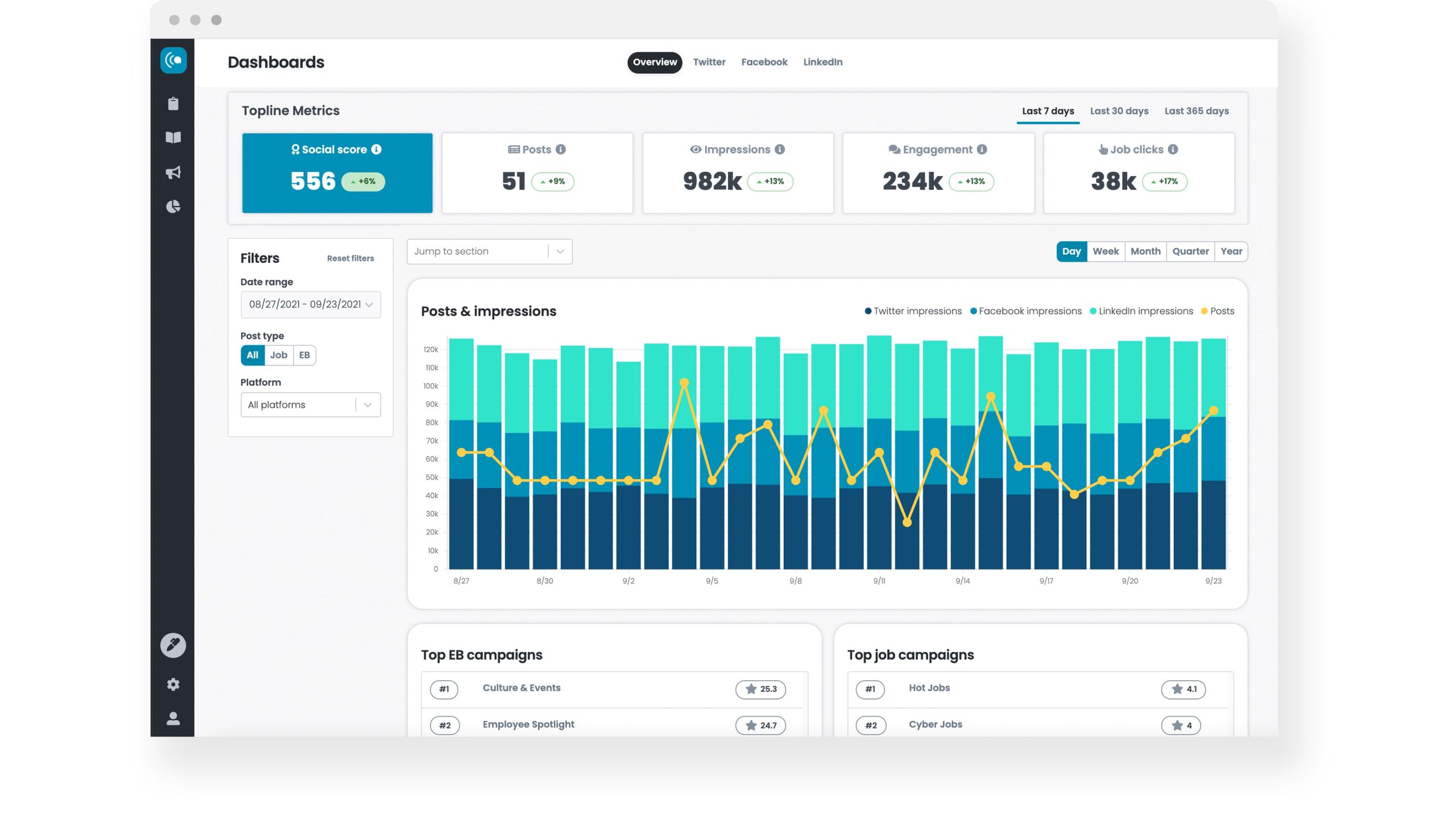
G2 rating: 4.8/5 based on 27 reviews.
Capterra rating: 4.7/5 based on 15 reviews.
CareerArc's typical customers are primarily based in the United States (82.64%), with smaller shares in Mexico (5.14%), India (3.95%), Canada (2.26%), and the United Kingdom (1.03%). Key industries include Hospital & Health Care (29%), Mining & Metals (14%), Automotive (14%), Internet (14%), Retail (14%), and Consumer Goods (14%).
According to G2, 52% of customers have more than 1000 employees, 28% have 51-1000 employees, and 20% have fewer than 50. Capterra reviews show 37.5% of customers with 1,001-5,000 employees, and smaller shares across other size categories.
CareerArc Pricing:
CareerArc's pricing starts at $10,000, aligning with industry averages for social recruiting platforms. This cost reflects the comprehensive features offered, including social media strategy, automation, publishing, and analytics, all designed to enhance talent acquisition efforts.
CareerArc Pros:
- Social Media Integration and Automation (mentioned 12 times): Users appreciate the seamless integration and automatic sharing of job postings across various social media platforms like Twitter, Facebook, and LinkedIn, enhancing reach and engagement.
- Customer Service Excellence (mentioned 11 times): The attentive, helpful, and responsive customer service, including dedicated contacts like Alyssa and Jackie, is highly valued for its support and innovative ideas.
- Ease of Use and User-Friendly Interface (mentioned 9 times): The platform is praised for its simplicity, ease of setup, and user-friendly dashboard, making it accessible even to those who are not tech-savvy.
CareerArc Cons:
- Limited Customization and Automation Features (mentioned 3 times): Users desire more options for customizing campaigns, including better control over hashtags, the ability to automatically pull in relevant content (e.g., RSS feeds, industry articles), and more flexibility in scheduling for multiple profiles.
- Content and Posting Variety Concerns (mentioned 2 times): There's a need for more variety in job postings and the ability to easily update and diversify images to keep content fresh.
- Integration and Authorization Issues (mentioned 2 times): Challenges with having to frequently reauthorize social media platforms like LinkedIn and issues with integrating ATS (Applicant Tracking System) for job tagging.
- Cost Concerns (mentioned 2 times): Concerns about the tool being too expensive, especially in relation to the cost per hire, and additional costs for auto-scheduling on each social media platform.
- User Interface and Navigation (mentioned 2 times): While many find the dashboard user-friendly, some users wish for improved searchability within job requisitions and find the platform not the easiest to navigate without frequent use.
- Onboarding and Time Zone Challenges (mentioned 2 times): The onboarding process can be cumbersome, and time zone differences sometimes delay getting immediate solutions.
- Customer Service (mentioned 1 time): Mixed reviews on customer service, with a suggestion for improvement in responsiveness and support.
- Platform Suitability and Strategy Alignment (mentioned 1 time): CareerArc may not fit all recruitment strategies, particularly for those focused less on post frequency and more on other aspects of social engagement.
- Lack of Detailed Analytics (mentioned 1 time): A desire for more in-depth referral data and the ability to drill down on map traffic to better understand candidate engagement sources.
- Difficulty in Reaching Target Audience (mentioned 1 time): Some users feel that the tool doesn't always reach the desired audience effectively, impacting candidate acquisition.
ClearCompany
ClearCompany, founded in 2004, is an applicant tracking system that raised $63.5 million, acquired Brainier Solutions, and was acquired by Gemspring Capital.
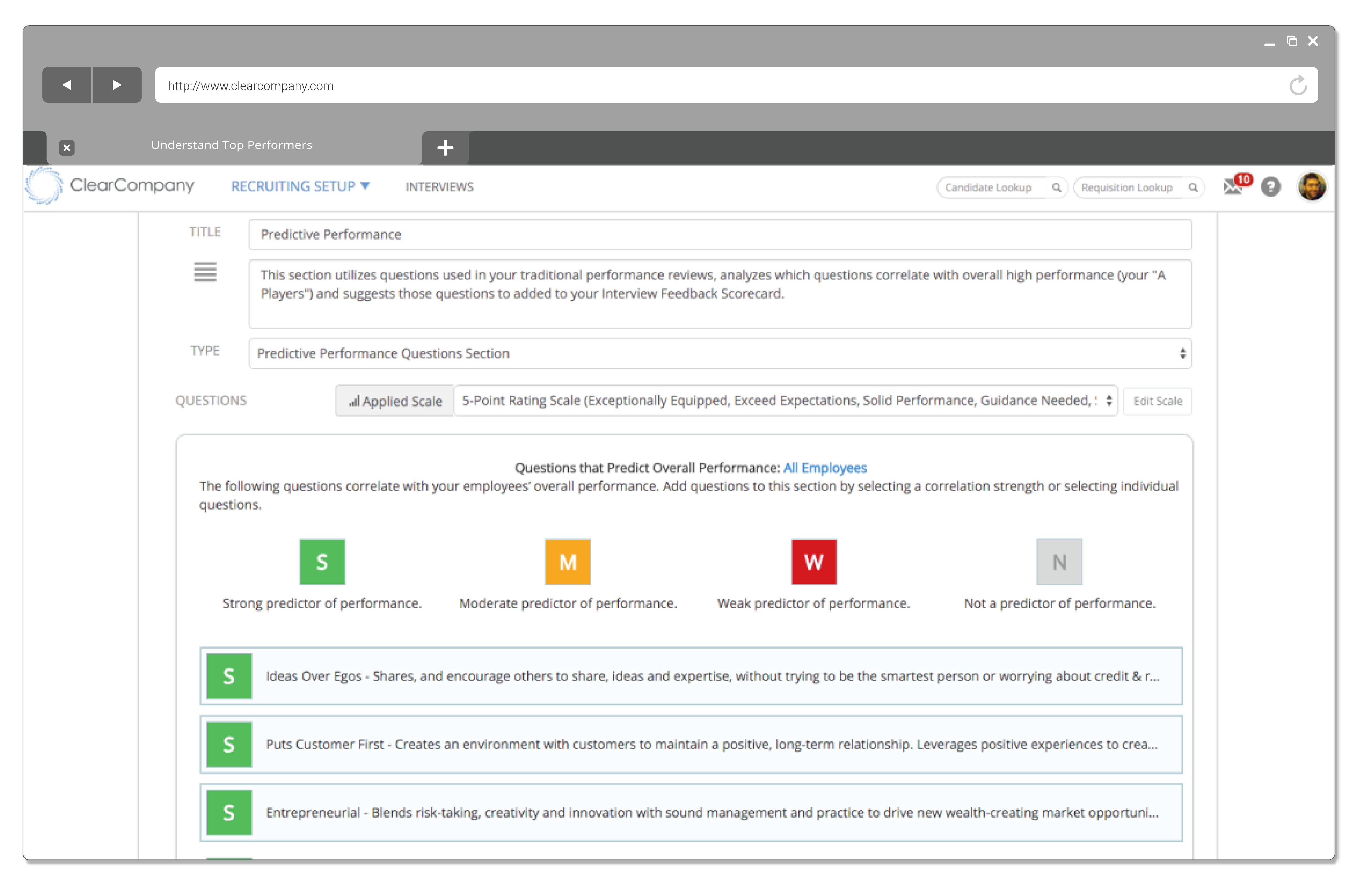
G2 rating: 4.6/5 based on 336 reviews.
Capterra rating: 4.4/5 based on 320 reviews.
ClearCompany's typical customers are primarily based in the United States (89.02%), with smaller shares in Canada (3.87%), India (1.35%), the United Kingdom (0.97%), and Nigeria (0.52%). Key industries include Management Consulting (7%), Hospital & Health Care (7%), Non-Profit Organization Management (5%), Electrical/Electronic Manufacturing (5%), and Telecommunications (4%).
According to G2, 54% of customers have 51-1000 employees, 16% have fewer than 50 employees, and 20% have more than 1000. Capterra reviews show 29.6% of customers with 51-200 employees, 22.4% with 201-500 employees, and smaller shares across other size categories.
ClearCompany Pricing:
ClearCompany's pricing begins at approximately $60 per user per month for the Essential Plan, aimed at small to medium-sized businesses, with annual billing. This plan covers basic talent acquisition and performance management. The Advanced Plan, suitable for larger organizations, starts at around $80 per user per month, offering enhanced analytics, integrations, and performance tools, also billed annually with a minimum of five users. The Enterprise Plan has custom pricing tailored to specific business needs, including comprehensive features and dedicated support. Additional setup fees may apply for customizations or extra add-ons.
ClearCompany Pros:
- User-Friendly and Easy to Navigate (mentioned 42 times): Many users appreciate the platform's user-friendly interface and easy navigation, making it accessible for both experienced and new users.
- Comprehensive and Integrated Platform (mentioned 27 times): Users value the all-in-one nature of ClearCompany, highlighting its comprehensive suite of features that cover various HR processes, including recruiting, onboarding, performance management, and more.
- Excellent Customer Support and Account Management (mentioned 25 times): The responsive and helpful customer support and account management teams are frequently praised for their assistance and quick resolution of issues.
ClearCompany Cons:
- User-Friendly and Easy to Navigate (mentioned 42 times): Many users appreciate the platform's user-friendly interface and easy navigation, making it accessible for both experienced and new users.
- Comprehensive and Integrated Platform (mentioned 27 times): Users value the all-in-one nature of ClearCompany, highlighting its comprehensive suite of features that cover various HR processes, including recruiting, onboarding, performance management, and more.
- Excellent Customer Support and Account Management (mentioned 25 times): The responsive and helpful customer support and account management teams are frequently praised for their assistance and quick resolution of issues.
- Ease of Use for Recruiting and Applicant Tracking (mentioned 23 times): The platform's recruiting and applicant tracking functionalities are highlighted for their efficiency and ease of use, making the hiring process smoother for recruiters.
- Customization Options (mentioned 18 times): Users appreciate the ability to customize different aspects of the platform, including job postings, email templates, and workflows, to fit their specific needs.
- Effective Onboarding Tools (mentioned 15 times): The onboarding tools are noted for their effectiveness in streamlining the onboarding process, making it easier to manage new hires.
- Stable and Reliable Platform (mentioned 12 times): The stability and reliability of the platform are commended, with users experiencing minimal technical issues.
- Performance Management Features (mentioned 10 times): The performance management tools, including annual review systems and goal tracking, are valued for helping users manage and evaluate employee performance.
- Integration Capabilities (mentioned 8 times): ClearCompany's ability to integrate with other systems and platforms, such as payroll systems, is seen as a significant advantage.
- Comprehensive Reporting and Analytics (mentioned 7 times): The reporting and analytics features are praised for providing valuable insights that help in making data-driven decisions.
Comeet
Comeet, founded in 2013, is an applicant tracking system based in Israel that raised $7.2 million and acquired Spark Hire.
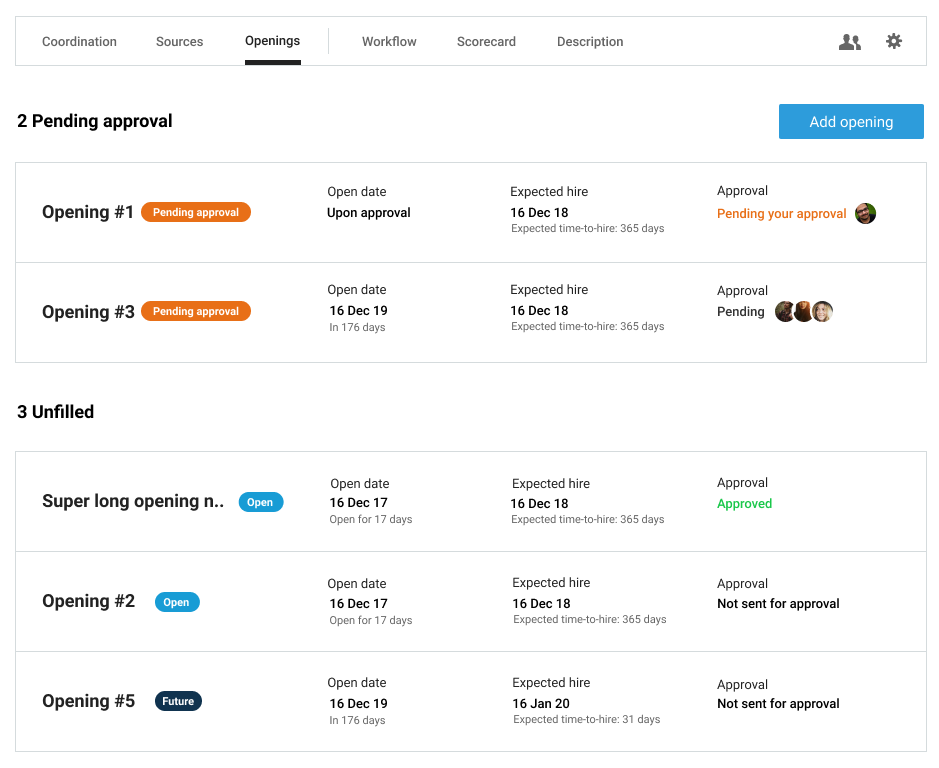
G2 rating: 4.6/5 based on 192 reviews.
Capterra rating: 4.7/5 based on 120 reviews.
Comeet's typical customers are primarily based in Israel (35.61%), with smaller shares in the United States (18.27%), Ukraine (13.08%), Colombia (6.88%), and Germany (4.49%). Key industries include Computer Software (23%), Information Technology and Services (13%), Financial Services (7%), Human Resources (5%), and Internet (4%).
According to G2, 74% of customers have 51-1000 employees, 18% have fewer than 50 employees, and 8% have more than 1000. Capterra reviews show 33.1% of customers with 51-200 employees, 26.3% with 201-500 employees, and smaller shares across other size categories.
Comeet Pricing:
Comeet’s pricing is based on the plan tier and company size, with costs starting at $300. Custom quotes are available, allowing businesses to start hiring in less than a week.
Comeet Pros:
- User-Friendly and Intuitive Interface (18 mentions): Users frequently praise Comeet for its simple, easy-to-use interface that facilitates quick learning and efficient navigation.
- Efficient Recruitment Process Management (16 mentions): The tool is recognized for streamlining various recruitment tasks, such as scheduling, communicating with candidates and hiring managers, and managing candidate profiles and interview processes.
- Effective Collaboration Features (12 mentions): The platform supports strong collaboration among team members, enhancing coordination and sharing of candidate evaluations and comments.
Comeet Cons:
- User Interface and Navigation Issues (8 mentions): Users find the user interface sometimes confusing, especially for new or junior users, and the navigation options can be unclear or cumbersome.
- Limited Customization and Flexibility (7 mentions): Several users noted a lack of customization options, particularly in terms of modifying interview workflows and scorecards, as well as the limited automation features.
- Integration Challenges (5 mentions): Difficulties with integrating Comeet with other platforms like IM platforms or certain ATS features were mentioned, impacting the tool's efficiency.
- Suboptimal Reporting and Analytics (5 mentions): Users expressed a desire for more sophisticated reporting tools and better quality in exported data visualization, such as charts and graphs.
- Performance Issues (4 mentions): Some users reported that the application can be slow, particularly when switching between tabs or during heavy usage.
- Evaluation and Feedback Limitations (3 mentions): There were comments about the inflexibility in editing evaluations and the lack of customizable templates for candidate assessments.
- Email Communication Issues (3 mentions): Problems with email communications, including emails going to spam and a lack of notifications for sent emails, were noted.
- Cost Concerns (2 mentions): The cost structure of Comeet, particularly how it scales with company size, was seen as potentially expensive for smaller businesses.
- Limited Mobile Capabilities (2 mentions): The absence of a dedicated mobile app was highlighted as a drawback, limiting accessibility and ease of use on mobile devices.
- Specific Feature Requests (2 mentions): Users requested more options in certain areas, like the reasons for candidate rejection and more extensive integration with job boards and social media.
Fountain
Fountain, founded in 2014, is an applicant tracking system that raised $218.9 million and acquired Clevy.
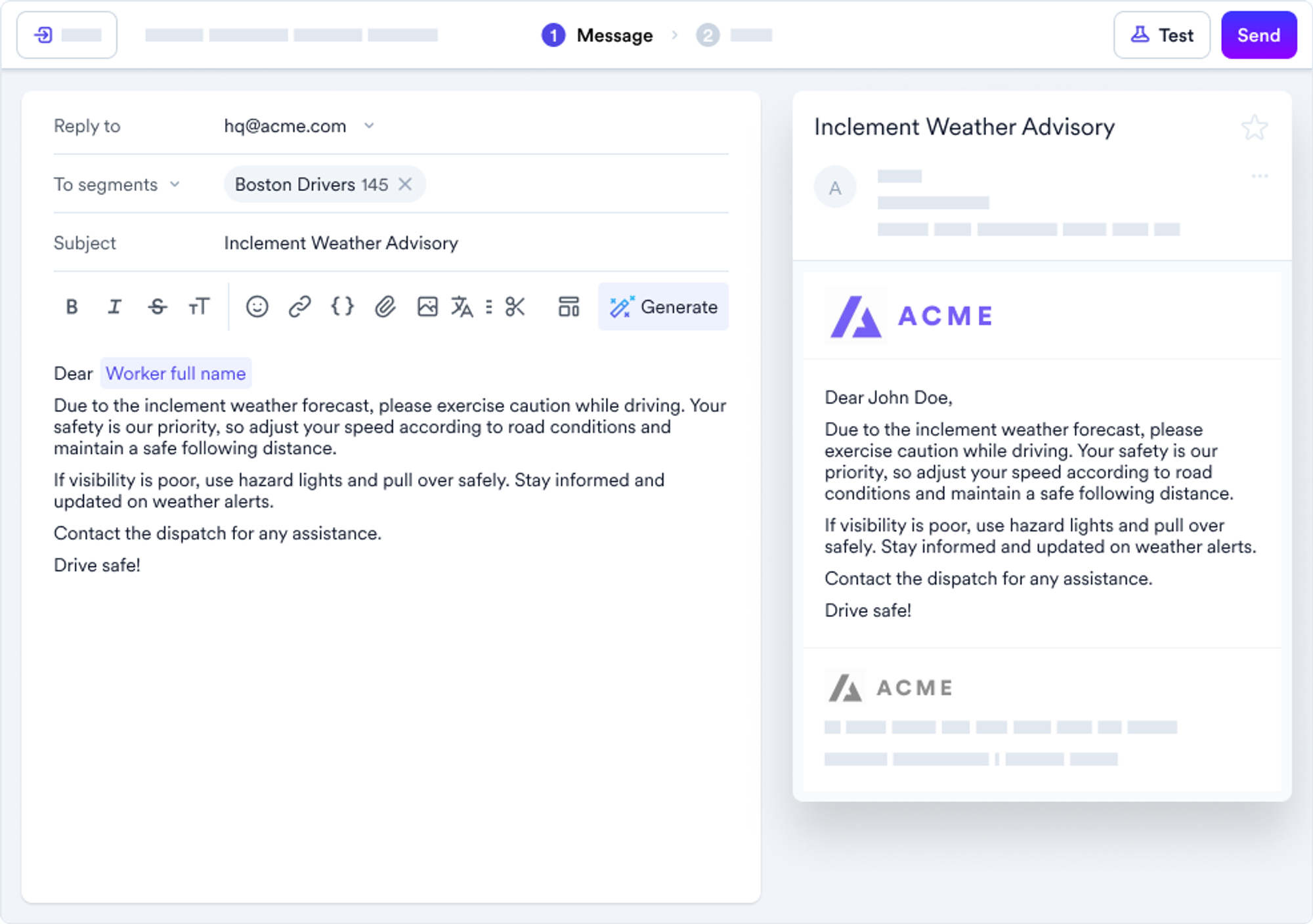
G2 rating: 4.3/5 based on 126 reviews.
Capterra rating: 4.6/5 based on 38 reviews.
Fountain's typical customers are primarily based in the United States (82.8%), with smaller shares in the Philippines (2.59%), the United Kingdom (1.96%), Kenya (1.82%), and Germany (1.76%). Key industries include Consumer Services (16%), Transportation/Trucking/Railroad (11%), Internet (11%), Food & Beverages (8%), and Outsourcing/Offshoring (5%).
According to G2, 44% of customers have 51-1000 employees, 26% have fewer than 50 employees, and 30% have more than 1000. Capterra reviews show 21.1% of customers with 51-200 employees, 18.4% with 11-50 and 201-500 employees, and smaller shares across other size categories.
Fountain Pricing:
Fountain ATS offers various pricing options, starting at $49 per month, with plans that can reach $10,000 for custom, quote-based solutions. Additionally, Fountain provides flexible plans, including a free trial and subscription options, with features available starting as low as $0.01 per year.
Fountain Pros:
- Automation and Efficiency in Recruitment (mentioned 14 times): Users highly value the automation features for scheduling interviews, filtering applicants, and sending automated messages, which significantly streamline the recruitment process.
- Customization and Flexibility (mentioned 12 times): The ability to customize workflows, add different stages, and tailor the platform to specific business needs is greatly appreciated for its adaptability.
- User-Friendly Interface and Ease of Use (mentioned 11 times): The platform's intuitive design and easy navigation are praised, making it accessible for both recruiters and applicants to use without extensive training.
Fountain Cons:
- Technical Issues and Bugs (mentioned 5 times): Technical glitches, such as slow loading times, freezing, issues with downloading files, and SMS delivery problems, were mentioned, alongside a desire for more reliable performance and fewer bugs.
- Integration and Customization Limitations (mentioned 4 times): Users desire more direct integrations with third-party products and express concerns over the limited customization options for design, branding, and email tools.
- User Interface and Usability Concerns (mentioned 3 times): Some users find the platform hard to use and not user-friendly, with specific requests for a darker theme to reduce eye strain and comments on the interface being clunky, especially when formatting messages and emails.
- Learning Curve and Complexity (mentioned 2 times): A few responses indicate that Fountain has a steep learning curve and that mastering its features can take time, particularly when managing people in multiple steps or dealing with the platform's extensive functionalities.
- Reporting and Analytics (mentioned 2 times): There are calls for improvements in reporting functions, with users seeking more comprehensive analytics and the ability to connect automated exports to tools like Google Sheets.
- Calendar and Scheduling Features (mentioned 2 times): Users would like to see enhancements in the calendar function, noting difficulties in setting up availabilities and a preference for more flexible scheduling options.
- Applicant Management and Communication (mentioned 2 times): There are suggestions for better management of applicant stages and communication, including the ability to delete or reclassify rejected or fraudulent applications and improved notification systems.
- Integration with Other Software and HRIS (mentioned 2 times): The need for better integration with major HRIS systems and other software partners is highlighted, with users pointing out the current limitations and the impact on workflow.
- Mobile Experience and Exporting Data (mentioned 2 times): Users mention the mobile version not being well-adjusted and issues with exporting data, such as special characters in column names causing problems.
- General Feedback and Miscellaneous Issues (mentioned 1 time): Other feedback includes requests for real-time collaboration features, improvements to the login page, and concerns over the system occasionally being down. Some users also express a desire for the platform to be more intuitive and easier to troubleshoot.
Greenhouse
Greenhouse, founded in 2012, is an applicant tracking system that raised $110.1 million, acquired Interseller and Parklet, and was acquired by TPG.
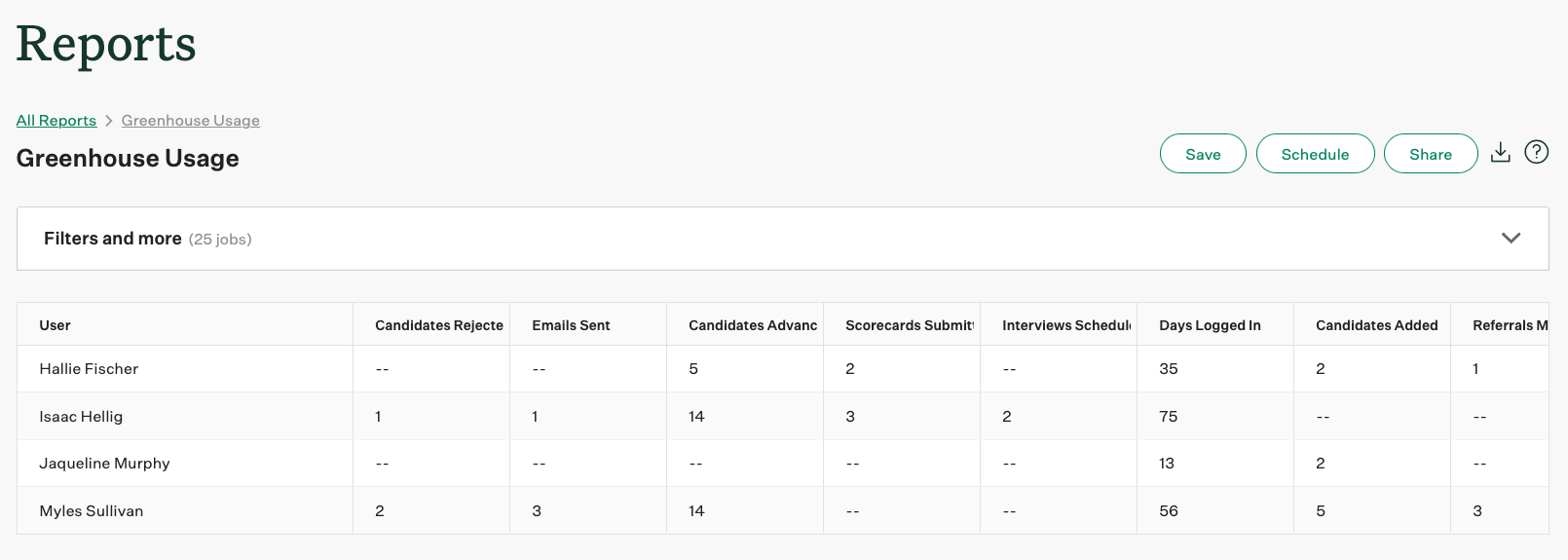
G2 rating: 4.4/5 based on 2568 reviews.
Capterra rating: 4.5/5 based on 678 reviews.
Greenhouse's typical customers are primarily based in the United States (62.27%), with smaller shares in India (8.41%), the United Kingdom (5.91%), Canada (4.86%), and Brazil (2.15%). Key industries include Computer Software (23%), Financial Services (6%), Human Resources (6%), Staffing and Recruiting (6%), and Information Technology and Services (5%).
According to G2, 64% of customers have 51-1000 employees, 10% have 50 or fewer employees, and 26% have more than 1000. Capterra reviews show 21% of customers with 51-200 employees, 18.4% with 1,001-5,000 employees, and smaller shares across other size categories.
Greenhouse Pricing:
Greenhouse pricing is generally negotiated based on the number of employees, with no standardized rates. The median annual cost is around $12,250, but actual pricing can vary widely. Greenhouse offers three plans—Essential, Advanced, and Expert—targeting different company sizes and needs. Based on market data, pricing starts at $6,500 per year for companies with 1–10 employees, going up to $24,500+ for companies with over 1,000 employees. Quotes may vary, with some clients reporting costs between $18,000 and $30,000 for medium to large companies, plus potential implementation fees.
Greenhouse Pros:
- Ease of Use and User-Friendly Interface (mentioned 21 times): Users consistently praise the simplicity and intuitive design of Greenhouse, which makes it easy to navigate and use the software effectively.
- Centralized Information Management (mentioned 9 times): Greenhouse provides a centralized location for all candidate-related information, including resumes, reviews, and interview notes, streamlining the recruitment process.
- Efficient Candidate Tracking and Workflow Management (mentioned 8 times): Users appreciate the seamless tracking of candidates through the recruitment process and the ability to organize requisitions and pipelines efficiently.
Greenhouse Cons:
- Complex and Confusing User Interface (mentioned 10 times): Users find the UI outdated and not user-friendly, with navigation and layout often confusing and unintuitive, making it hard to locate information.
- Slow and Inefficient Customer Support (mentioned 6 times): Users report slow response times and unhelpful customer support, leading to delays in resolving issues and frustration with the ticketing system.
- Limited Customization and Integration Options (mentioned 6 times): The platform's customization options and integrations with other tools are limited, with users wishing for more flexibility and better integration capabilities, particularly with third-party apps.
- Difficult Reporting and Analytics (mentioned 6 times): The reporting and analytics features are seen as clunky, not robust, and lacking in customization, making it challenging to extract useful insights.
- High Cost (mentioned 5 times): Greenhouse is considered one of the more expensive ATS options, which can be a barrier for smaller companies or startups with limited budgets.
- Steep Learning Curve (mentioned 5 times): Users mention a significant learning curve and complexity in setting up and customizing the system, requiring time and technical expertise to fully leverage its capabilities.
- Inefficient Candidate Search and Sorting (mentioned 4 times): The search functionality, particularly by phone number, is inadequate, and users find it challenging to sort and manage candidates efficiently.
- Inadequate Mobile App (mentioned 4 times): The mobile app lacks basic features and functionality, making it difficult for users to access and manage information on the go.
- Scheduling and Notification Issues (mentioned 3 times): Users find the scheduling features lacking and notifications insufficient, causing inconvenience and inefficiencies in managing interviews and candidate communications.
- Document Compatibility Problems (mentioned 2 times): Issues with document compatibility, especially with Word files, lead to inconsistencies in formatting and additional effort to correct these issues.
the best candidates faster




